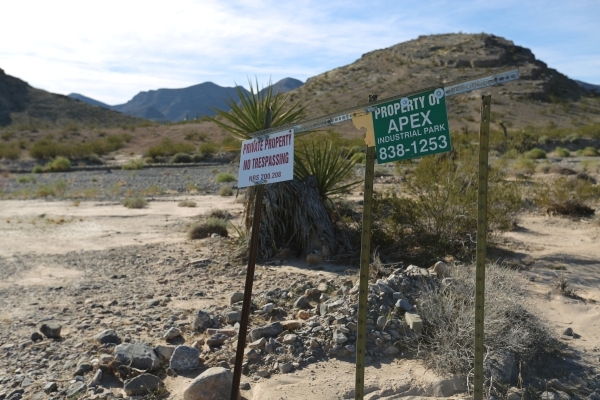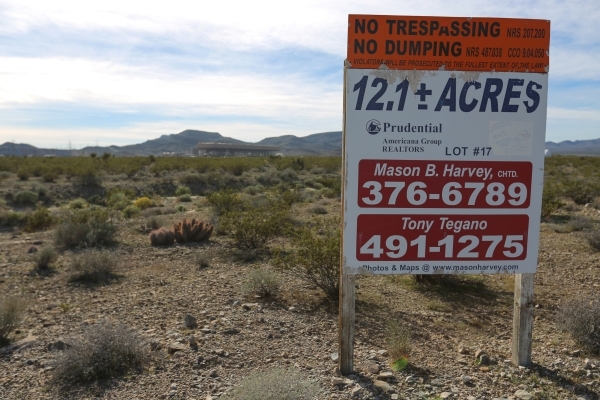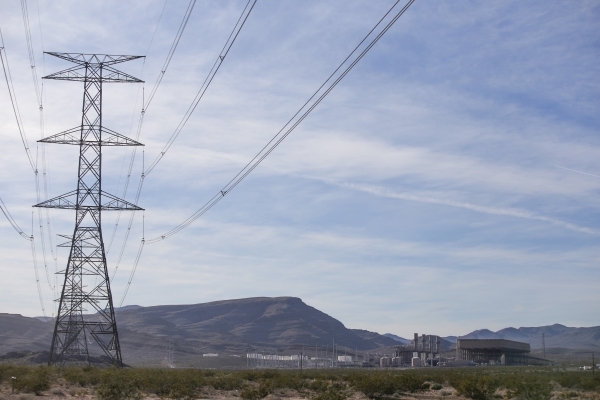EDITORIAL: Special session is all about Apex
This week's special legislative session is about so much more than Faraday Future, the electric car startup that picked North Las Vegas for a $1 billion, 3 million-square-foot manufacturing plant with the potential to forever transform Southern Nevada's economy.
The special session, at which lawmakers will consider a package of tax incentives necessary to close the deal with Faraday, is about the long game of economic development. It's about the largely empty desert northeast of Las Vegas where Faraday Future will build its high-tech, highly connected vehicles. It's about Apex Industrial Park.
Today, Apex is nearly 20,000 acres of nothing, a blank slate northwest of Interstate 15 and southwest of U.S. Highway 93, the road that takes traffic to Alamo, Pioche and points north. About one-third of the land is developable, but there's no infrastructure in place to allow the immediate construction of manufacturing, warehousing or distribution centers, data processing and storage facilities or any other businesses that require a huge footprint. The 15 companies currently operating at Apex use groundwater and septic systems.
A report presented by Robert Lang, director of the UNLV Brookings Mountain West Institute, determined that if the Apex site were built out, the industrial park could support 57,960 direct jobs. Throw in supporting indirect job creation, and that's billions and billions of dollars in economic impact and an estimated $670 million boost in state and local tax collections, the report said. Apex could become an economy unto itself.
And there's no shortage of interest in Apex. The Las Vegas Global Economic Alliance, the local economic development authority, said that last year alone, more than 150 large industrial operations put out feelers for expansion into Southern Nevada. But the valley's lack of industrial buildings with at least 175,000 square feet sends most of those businesses searching for space elsewhere. A 2014 joint study by the LVGEA and RCG Economics determined that the valley lost out on about 18,000 jobs in a single year because of a lack of suitable industrial space.
Apex has the space for those kinds of buildings. But the structures can't be built without suitable utility connections — especially a municipal water supply. And Apex is part of incorporated North Las Vegas, which was nearly wiped off the map by the Great Recession. The city narrowly avoided state receivership, has almost no reserves and has a Ba2 credit rating from Moody's, which is given to entities with "speculative elements and a significant credit risk." By comparison, the state of Nevada has an Aa2 rating from Moody's, which is given to entities with "high quality and very low credit risk." If the city of North Las Vegas attempted to finance the infrastructure that would allow Apex to boom, the interest on the debt would rival that of a credit card.
Which brings us back to the Faraday Future project, which is expected to employ 4,500 people at an average wage of more than $22 per hour and be operational within two years. The plant would require an estimated 640 acre-feet of groundwater per year, about as much as 1,280 average valley homes would consume. That's a sizable slice of the roughly 3,000 acre-feet of groundwater available for the entire park.
Because Faraday Future is poised to become Apex's first anchor tenant, its water supply is assured. That won't be the case for too many companies interested in following the automaker to the North Las Vegas desert. Any share of a limited groundwater allotment isn't likely to provide businesses with the certainty that their investments will be able to perform in the decades ahead.
For Apex to substantially grow beyond Faraday Future, it must be connected to North Las Vegas' municipal water supply. A water line and pumping station capable of delivering water to Apex is estimated to cost about $150 million. Because it isn't necessary to Faraday's future, Gov. Brian Sandoval says the pipeline and pumping station won't be part of the special session agenda.
But lawmakers can take steps this week to pave the way for the pipeline. They'll be asked to modify a tax increment law to allow the bonding of infrastructure. Faraday Future's plant will require tens of millions of dollars of water and wastewater infrastructure that allows the company to access groundwater, but is also compatible with municipal water and sewer lines, once they're built. Lawmakers should go beyond that and fund water infrastructure that allows a handful of neighbors to set up shop around the Faraday site. The more businesses Apex attracts, the more quickly the municipal water pipeline and pumping station will be justifiable.
The $217 million in tax incentives the state is offering Faraday through sales, property and payroll tax abatements over 15 years is, unfortunately, the cost of attracting a $1 billion manufacturing investment. Saying no sends Faraday elsewhere.
Lawmakers should approve them, not merely to bring Faraday to Southern Nevada, but to finally jump-start investment in Apex, the region's greatest economic development asset. Gov. Sandoval and state leaders mustn't lose this momentum. An open dialogue about how to quickly fund and construct a water line to Apex should start immediately. North Las Vegas can't make this happen alone, and the Faraday project never would have happened without the initiative of North Las Vegas Mayor John Lee.
Let the Apex special session begin.





















